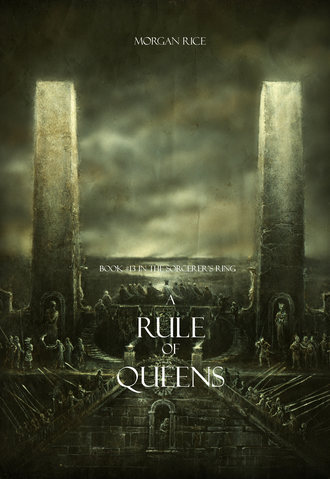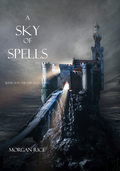
Морган Райс
A Rule of Queens
Chapter Six
Darius ran down the dirt trail leading from his village, following the footprints toward Volusia, a determination in his heart to save Loti and murder the men who took her. He ran with a sword in his hand – a real sword, made of real metal – the first time he’d ever wielded real metal in his life. That alone, he knew, would be enough to have him, and his entire village, killed. Steel was taboo – even his father and his father’s father feared to possess it – and Darius knew he had crossed a line in which there was now no turning back.
But Darius no longer cared. The injustice of his life had been too much. With Loti gone, he cared about nothing but retrieving her. He had hardly had a chance to know her, and yet paradoxically, he felt as if she were his whole life. It was one thing for he himself to be taken away as a slave; but for her to be taken away – that was too much. He could not allow her to go and still consider himself a man. He was a boy, he knew, and yet he was becoming a man. And it was these very decisions, he realized, these hard decisions that no one else was willing to make, that were the very things that made one a man.
Darius charged down the road alone, sweat blurring his eyes, breathing hard, one man ready to face an army, a city. There was no alternative. He needed to find Loti and bring her back, or die trying. He knew that if he failed – or even if he succeeded – it would bring vengeance on his entire village, his family, all his people. If he stopped to think about that, he might have even turned around.
But he was driven by something stronger than his own self-preservation, his family’s and people’s preservation. He was driven by a desire for justice. For freedom. By a desire to cast off his oppressor and to be free, even if for just one moment in his life. If not for himself, than for Loti. For her freedom.
Darius was driven by passion, not by logical thought. It was the love of his life out there, and he had suffered one time too many at the hands of the Empire. Whatever the consequences, he no longer cared. He needed to show them that there was one man amongst his people, even if it was just one man, even if just a boy, who would not suffer their treatment.
Darius ran and ran, twisting and turning his way out past the familiar fields, and into the outskirts of Volusian territory. He knew that just being found here, this close to Volusia, would alone merit his death. He followed the tracks, doubling his speed, seeing the zerta prints close together, and knowing they were moving slowly. If he went fast enough, he knew, he could catch them.
Darius rounded a hill, gasping, and finally, in the distance, he spotted what he was looking for: there, perhaps a hundred yards off, stood Loti, chained by her neck with thick iron shackles, from which led a long chain, a good twenty feet, to the back harness of a zerta. On the zerta rode the Empire taskmaster, the one who had taken her away, his back to her, and by his side, walking beside them, two more Empire soldiers, wearing the thick black and gold armor of the empire, glistening in the sun. They were nearly twice the size of Darius, formidable warriors, men with the finest weapons, and a zerta at their command. It would, Darius knew, take a host of slaves to overcome these men.
But Darius did not let fear get in his way. All he had to carry him was the strength of his spirit, and his fierce determination, and he knew he would have to find a way to make that be enough.
Darius ran and ran, catching up from behind on the unsuspecting caravan, and he soon caught up to them, racing up to Loti from behind, raising his sword high, and as she looked over at him with a startled expression, slashing down on the chain affixing her to the zerta.
Loti cried out and jumped back, shocked, as Darius severed her chains, freeing her, the distinctive ring of metal cutting through the air. Loti stood there, free, the shackles still around her neck, the chain dangling at her chest.
Darius turned and saw equal looks of astonishment on the face of the Empire taskmaster, looking down from his seat on the zerta. The soldiers walking on the ground beside him stopped, too, all of them stunned at the sight of Darius.
Darius stood there, arms trembling, holding out his steel sword before him and determined not to show fear as he stood between them and Loti.
“She does not belong to you,” Darius called out, his voice shaky. “She is a free woman. We are all free!”
The soldiers looked up to the taskmaster.
“Boy,” he called out to Darius, “you’ve just made the biggest mistake of your life.”
He nodded down to his soldiers, and they raised their swords and charged Darius.
Darius stood his ground, holding his sword in trembling hands, and as he did, he felt his ancestors looking down on him. He felt all the slaves who had ever been killed looking down on him, supporting him. And he began to feel a great heat rising up within him.
Darius felt his hidden power deep within beginning to stir, itching to be summoned. But he would not allow himself to go there. He wanted to fight them man to man, to beat them as any man would, to apply all of his training with his brothers in arms. He wanted to win as a man, fight like a man with real metal weapons, and defeat them on their own terms. He had always been faster than all of the older boys, with their long wooden swords and muscular frames, even boys twice his size. He dug in, and braced himself as they charged.
“Loti!” he called out, not turning, “RUN! Go back to the village!”
“NO!” she yelled back.
Darius knew he had to do something; he could not stand there and wait for them to reach him. He knew he had to surprise them, to do something they would not expect.
Darius suddenly charged, choosing one of the two soldiers and racing right for him. They met in the middle of the dirt clearing, Darius letting out a great battle cry. The soldier slashed his sword at Darius’s head, but Darius raised his sword and blocked it, their swords sparking, the impact of metal on metal the first Darius had ever felt. The blade was heavier than he thought, the soldier’s blow stronger, and he felt a great vibration, felt his entire arm shaking, up to his elbow and into his shoulder. It caught him off guard.
The soldier swung around quickly, aiming to strike Darius from the side, and Darius spun and blocked. This did not feel like sparring with his brothers; Darius felt himself moving slower than usual, the blade so heavy. It was taking some getting used to. It felt as if the other soldier were moving twice as fast as he.
The soldier swung again, and Darius realized he could not beat him blow for blow; he had to draw on his other skills.
Darius stepped sideways, ducking the blow instead of meeting it, and he then threw an elbow into the soldier’s throat. He caught it perfectly. The man gagged and stumbled back, hunched over, grasping his throat. Darius raised the butt of his sword and brought it down on his exposed back, sending him face down into the dirt.
At the same time the other soldier charged, and Darius spun, raised his sword, and blocked a mighty blow as it came down for his face. The soldier kept charging, though, driving Darius back and down to the ground, hard.
Darius felt his rib cage being crushed as the soldier lay on top of him, both of them landing on the hard dirt in a big cloud of dust. The soldier dropped his sword and reached out with his hands, trying to gouge out Darius’s eyes with his fingers.
Darius grabbed his wrists, holding them back with shaking hands, but losing ground. He knew he needed to do something fast.
Darius raised a knee and turned, managing to spin the man onto his side. In the same motion, Darius reached down and extracted the long dagger he spotted in the man’s belt – and in the same motion, raised it high and plunged it into the man’s chest, as they rolled on the ground,
The soldier cried out, and Darius lay there on top of him, and watched him die before his eyes. Darius lay there, frozen, shocked. It was the first time he had killed a man. It was a surreal experience. He felt victorious yet saddened at the same time.
Darius heard a cry from behind, snapping him out of it, and he turned to see the other soldier, the one he had knocked out, back on his feet, racing for him. He raised his sword and swung it for his head.
Darius waited, focused, then ducked at the last second; the soldier went stumbling past him.
Darius reached down and drew the dagger from the dead man’s chest and spun around, and as the soldier turned back and charged again, Darius, on his knees, leaned forward and threw it.
He watched the blade spin end over end, then finally lodge itself into the soldier’s heart, piercing his armor. The Empire’s own steel, second to none, used against them. Perhaps, Darius thought, they should have crafted weapons less sharp.
The soldier sank to his knees, eyes bulging, and he fell sideways, dead.
Darius heard a great cry behind him, and he jumped to his feet and wheeled to see the taskmaster dismounting from his zerta. He scowled and drew his sword and bore down on Darius with a great cry.
“Now I shall have to kill you myself,” he said. “But not only will I kill you, I shall torture you and your family and your entire village slowly!”
He charged for Darius.
This Empire taskmaster was obviously a greater soldier than the others, taller and broader, with greater armor. He was a hardened warrior, the greatest warrior Darius had ever fought. Darius had to admit he felt fear at this formidable foe – but he refused to show it. Instead, he was determined to fight through his fear, to refuse to allow himself to be intimidated. He was just a man, Darius told himself. And all men can fall.
All men can fall.
Darius raised his sword as the taskmaster bore down on him, swinging his great sword, flashing in the light, with both hands. Darius shifted and blocked; the man swung again.
Left and right, left and right, the soldier slashed and Darius blocked, the great clang of metal ringing in his ears, sparks flying everywhere. The man drove him back, further and further, and it took all of Darius’s might just to block the blows. The man was strong and quick, and Darius was preoccupied with just staying alive.
Darius blocked one blow just a bit too slowly, and he cried out in pain as the taskmaster found an opening and slashed his bicep. It was a shallow wound, but a painful one, and Darius felt the blood, his first wound in battle, and was stunned by it.
It was a mistake. The taskmaster took advantage of his hesitation, and he backhanded him with his gauntlet. Darius felt a great pain in his cheek and jaw as the metal met his face, and as the blow knocked him backwards, sent him stumbling several feet, Darius took a mental note to never stop and check a wound anytime in battle.
As Darius tasted blood on his lips, a fury washed over him. The taskmaster, charging him again, bearing down on him, was big and strong, but this time, with pain ringing in his cheek and blood on his tongue, Darius didn’t let that intimidate him. The first blows of battle had been struck, and Darius realized, as painful as they were, they were not that bad. He was still standing, still breathing, still living.
And that meant he still could fight. He could take blows, and he could still go on. Getting wounded was not as bad as he had feared. He might be smaller, less experienced, but he realized his skill was as sharp as any other man’s – and it could be just as deadly.
Darius let out a guttural cry and lunged forward, embracing battle this time instead of shying away from it. No longer fearing being wounded, Darius raised his sword with a cry, and slashed down at his opponent. The man blocked it, but Darius did not give up, swinging again and again and again, driving the taskmaster back, despite his greater size and strength.
Darius fought for his life, fought for Loti, fought for all of his people, his brothers in arms, and, slashing left and right, faster than he’d ever had, not letting the weight of the steel slow him down any longer, he finally found an opening. The taskmaster screamed out in pain as Darius slashed his side.
He turned and scowled at Darius, first surprise, then vengeance in his eyes.
He shrieked like a wounded animal, and charged Darius. The taskmaster threw down his sword, raced forward, and embraced Darius in a bear hug. He heaved Darius up off the ground, squeezing him so tight, Darius dropped his sword. It all happened so fast, and it was such an unexpected move, that Darius could not react in time. He had expected his foe to use his sword in battle, not his fists.
Darius, dangling off the ground, groaning, felt as if every bone in his body was going to crack. He cried out in pain.
The taskmaster squeezed him harder, so hard Darius was sure he was going to die. He then leaned back and head-butted Darius, smashing his forehead into Darius’s nose.
Darius felt blood gushing out, felt a horrible pain shoot through his face and eyes, stinging him, blinding him. It was a move he had not expected, and as the taskmaster leaned back to head-butt him again, Darius, defenseless, was certain he would be killed.
The noise of chains cut through the air, and suddenly the taskmaster’s eyes bulged wide open, and his grip loosened on Darius. Darius, gasping, confused, looked up, wondering why he’d let go. Then he saw Loti, standing behind the taskmaster, wrapping her dangling shackles around his neck, again and again, and squeezing with all her might.
Darius stumbled back, trying to catch his breath again, and he watched as the taskmaster stumbled back several feet, then reached back over his shoulder, grabbed Loti from behind, leaned over, and flipped her over his head. Loti landed on her back, on the hard ground, in the dirt, with a cry.
The taskmaster stepped forward, lifted his leg, aimed his boot over her face, and Darius saw he was about to bring it down and crush her face. The taskmaster was a good ten feet away by now, too far for Darius to reach him in time.
“NO!” Darius yelled.
Darius thought quickly: he reached down, grabbed his sword, stepped forward, and in one swift motion, he threw it.
The sword went flying through the air, end over end, and Darius watched, transfixed, as the point pierced the taskmaster’s armor, impaling him right through his heart.
His eyes bulged wide open again and Darius watched as he stumbled and fell, sinking to his knees, then to his face.
Loti quickly gained her feet, and Darius rushed to her side. He draped a reassuring hand over her shoulder, so grateful to her, so relieved she was okay.
Suddenly, a sharp whistle cut through the air; Darius turned and saw the taskmaster, lying on the ground, raise a hand to his mouth and whistle again, one last time, before he died.
A horrific roar shattered the silence, as the ground shook.
Darius looked over, and was terror-stricken to see the zerta suddenly charging right for them. It sprinted for them in a rage, lowering its sharp horns. Darius and Loti exchanged a look, knowing they had nowhere to run. Within moments, Darius knew, they would both be dead.
Darius looked all around, thinking quick, and he saw beside them the steep slope of the mountainside, littered with rocks and boulders. Darius raised his arm, his palm out, and draped his other arm around Loti, holding her close. Darius did not want to summon his power, but he knew that now, he had no choice, if he wanted to live.
Darius felt a tremendous heat rush through him, a power he could barely control, and he watched as a light shot forth through his open palm, onto the steep slope. There came a rumbling, gradual at first, then greater and greater, and Darius watched as boulders began tumbling down the steep mountainside, gaining steam.
An avalanche of boulders all rushed down on the zerta, crushing it just before it reached them. There was a huge cloud of dust, a tremendous noise, and finally, all was still.
Darius stood there, nothing but silence and dust swirling in the sun, hardly understanding what he had just done. He turned and saw Loti looking at him, saw the look of horror in her face, and he knew everything had changed. He had unleashed his secret. And now, there was no turning back.
Chapter Seven
Thor sat erect at the edge of their small boat, legs crossed, palms resting on his thighs, his back to the others as he stared out at the cold, cruel sea. His eyes were red from crying, and he did not want the others to see him like this. His tears had dried up long ago, but his eyes were still raw as he stared out, baffled, at the sea, wondering at the mysteries of life.
How could a son have been given to him, only to have been taken away? How could someone he loved so much disappear from him, be snatched away with no warning and no chance of return?
Life, Thor felt, was too relentlessly cruel. Where was the justice in it all? Why couldn’t his son return to him?
Thor would give anything – anything – walk through fire himself, die a million deaths – to have Guwayne given back to him.
Thor closed his eyes and shook his head as he tried to blot out the image of that burning volcano, the empty bassinet, the flames. He tried to block out the idea of his son dying such a painful death. His heart burned with fury, but most of all, sorrow. And shame, for not reaching his little boy sooner.
Thor also felt a deep pit in his stomach as he tried to imagine his encounter with Gwendolyn, his telling her the news. She would surely never look him in the eyes again. And she would never be the same person again. It was as if Thorgrin’s entire life had been snatched away from him. He did not know how to rebuild, how to pick up the pieces. How does one, he wondered, find another purpose for living?
Thor heard footsteps and felt the weight of a body beside him as the boat shifted, creaking. He looked over and was surprised to see Conven take a seat at his side, staring out. Thor felt as if he hadn’t talked to Conven in ages, not since his twin’s death. He welcomed seeing him here. As Thor looked at him, studied the sorrow in his face, for the first time, he understood. He really understood.
Conven didn’t say a word. He didn’t need to. His presence was enough. He sat beside him in sympathy, brothers in grief.
They sat there in silence for a long time, no noise but the sound of the wind ripping through, the sound of the waves lapping gently against the boat, this small boat of theirs adrift in an endless sea, their quest to find and rescue Guwayne taken away from all of them.
Finally Conven spoke:
“Not a day goes by when I don’t think of Conval,” he said, his voice somber.
They sat again silence for a long time. Thor wanted to reply, but he could not, too choked up to speak.
Finally, Conven added: “I grieve for you for Guwayne. I would have liked to see him become a great warrior, like his father. I know he would have been. Life can be tragic and cruel. It can give only to take away. I wish I could tell you I have recovered from my sorrow – but I have not.”
Thor looked at him, Conven’s brutal honesty somehow giving him a sense of peace.
“What keeps you living?” Thor asked.
Conven looked out at the water for a long time, then finally sighed.
“I think it was what Conval would have wanted,” he said. “He would have wanted me to go on. And so I go on. I do it for him. Not for myself. Sometimes we live a life for others. Sometimes we don’t care enough to live it for ourselves, so we live it for them. But, I am coming to realize, sometimes that must be enough.”
Thor thought of Guwayne, now dead, and he wondered what his son would have wanted. Of course, he would have wanted Thorgrin to live, to take care of his mother, Gwendolyn. Thor knew that logically. But in his heart, it was a hard concept to grasp.
Conven cleared his throat.
“We live for our parents,” he said. “For our siblings. For our wives and sons and daughters. We live for everybody else. And sometimes, when life has beaten you down so much that you don’t want to go on for yourself, that has to be enough.”
“I disagree,” came a voice.
Thor looked over to see Matus coming up on his other side, sitting and joining them. Matus looked out at the sea, stern and proud.
“I believe there is another thing we live for,” he added.
“And what is that?” Conven asked.
“Faith.” Matus sighed. “My people, the Upper Isle men, they pray to the four gods of the rocky shores. They pray to the gods of the water and wind and sky and rocks. Those gods have never answered my prayers. I pray to the ancient god of the Ring.”
Thor looked at him, surprised.
“I have never known an Upper Isle men to share the faith of the Ring,” Conven said.
Matus nodded.
“I am unlike my people,” he said. “I always have been. I wanted to enter the monastic order when I was young, but my father would never hear of it. He insisted I take up arms, like my brothers.”
He sighed.
“I believe we live for our faith, not for others,” he added. “That is what carries us through. If our faith is strong enough, really strong enough, then anything can happen. Even a miracle.”
“And can it return my son to me?” Thor asked.
Matus nodded back at him, unflinching, and Thor could see the certainty in his eyes.
“Yes,” Matus answered flatly. “Anything.”
“You lie,” Conven said, indignant. “You give him false hope.”
“I do not,” Matus retorted.
“Are you saying faith will return my dead brother to me?” Conven urged, angry.
Matus sighed.
“I am saying that all tragedy is a gift,” he said.
“A gift?” Thor asked, horrified. “Are you saying the loss of my son is a gift?”
Matus nodded back confidently.
“You are being given a gift, as tragic as that sounds. You can’t know what it is. You might not for a long time. But one day, you will see.”
Thor turned and looked out at the sea, confused, unsure. Was this all a test? he wondered. Was it one of the tests his mother had spoken of? Could faith alone bring his son back? He wanted to believe it. He really did. But he did not know if his faith was strong enough. When his mother had spoken of tests, Thor had been so sure he could pass anything that was thrown his way; yet now, feeling as he did, he did not know if he was strong enough to go on.
The boat rocked on the waves, and suddenly the tides turned, and Thor felt their small boat turning around and heading the opposite direction. He snapped out of it and checked back over his shoulder, wondering what was happening. Reece, Elden, Indra, and O’Connor were all still rowing and manning the sail, a confused look across their face, as their small sail flapped wildly in the wind.
“The Northern Tides,” Matus said, standing, hands on his hips and looking out, studying the waters. He shook his head. “This is not good.”
“What is it?” Indra asked. “We can’t control the boat.”
“They sometimes pass through the Upper Isles,” Matus explained. “I have never seen them myself, but I have heard about them, especially this far north. They are a riptide. Once you’re caught in them, they take you where they please. No matter how much rowing or sailing you try to do.”
Thor looked down, and saw the water below them rushing by at twice the speed. He looked out and saw they were heading toward a new, empty horizon, purple and white clouds spotting the sky, both beautiful and foreboding.
“But we’re heading east now,” Reece said, “and we need to head west. All of our people are west. The Empire is west.”
Matus shrugged.
“We head where the tides take us.”
Thor looked out in wonder and frustration, realizing that each passing moment was taking them further from Gwendolyn, further from their people.
“And where does it end?” O’Connor asked.
Matus shrugged.
“I know only the Upper Isles,” he said. “I have never been this far north. I know nothing of what lies beyond.”
“It does end,” Reece spoke up, darkly, and all eyes turned to him.
Reece looked back, grave.
“I was tutored on the tides years ago, at a young age. In the ancient book of Kings, we had an array of maps, covering every portion of the world. The Northern Tides lead to the eastern edge of the world.”
“The eastern edge?” Elden said, concern in his voice. “We’d be on the other end of the world from our people.”
Reece shrugged.
“The books were ancient, and I was young. All I really remember was that the tides were a portal to the Land of Spirits.”
Thor looked at Reece, wondering.
“Old wives’ tales and fairytales,” O’Connor said. “There is no portal to the Land of Spirits. It was sealed off centuries ago, before our fathers walked the earth.”
Reece shrugged, and they all fell silent as they turned and stared out at the seas. Thor examined the fast-moving waters, and he wondered: Where on earth were they being lead?
* * *
Thor sat alone, at the edge of the boat, staring into the waters as he had been for hours, the cold spray hitting him in the face. Numb to the world, he barely felt it. Thor wanted to be in action, to be hoisting sails, rowing – anything – but there was nothing for any them to do now. The Northern tides were taking them where they would, and all they could do was sit idly by and watch the currents, their boat rolling in the long waves, and wonder where they would end up. They were in the hands of the fates now.
As Thor sat there, studying the horizon, wondering where the sea would end, he felt himself drifting into nothingness, numb from the cold and the wind, lost in the monotony of the deep silence that hung over all of them. The seabirds that had at first circled them had disappeared long ago, and as the silence deepened, as the sky fell darker and darker, Thor felt as if they were sailing into nothingness, into the very ends of the earth.
It was hours later, as the last light of day was falling, that Thor sat upright, spotting something on the horizon. At first he was certain it was an illusion; but as the currents became stronger, the shape became more distinct. It was real.
Thor sat up straight, for the first time in hours, then rose to his feet. He stood there, boat swaying, hands on his hips, looking out.
“Is it real?” came a voice.
Thor looked over to see Reece stepping forward beside him. Elden, Indra, and the rest soon joined them, all staring out in wonder.
“An island?” O’Connor wondered aloud.
“Looks like a cave,” Matus said.
As they approached, Thor began to see the outline of it, and he saw that it was indeed a cave. It was a massive cave, an outcropping of rock that rose up from the sea, emerging here, in the midst of a cruel and endless ocean, rising hundreds of feet high, the opening shaped in a big arch. It looked like a giant mouth, ready to swallow all the world.
And the currents were taking their boat right toward it.
Thor stared at in wonder, and he knew it could only be one thing: the entrance to the Land of the Spirits.







